WESSLING tracks down tyre abrasion
Plastics and the resulting microplastics increasingly present a problem for the environment. One source of microplastics that should not be underestimated is tyre abrasion. In Germany alone, an estimated 60,000 to 100,000 tons of abrasion are generated each year. For the new research project "Tyre abrasion in the environment", WESSLING and other partners are investigating the path of tyre particles into the environment and their life cycle. The declared goal: to develop prevention strategies for more environmental protection. The project is part of the newly launched research project of the Federal Ministry of Education and Research (BMBF), "Plastics in the Environment", and is scheduled to run for three years.
The exact quantities of tyre abrasion and the way into the water, for example via road runoff, have not yet been sufficiently researched," says WESSLING expert Dr Jens Reiber explaining the reason for the research project. “The challenge is to determine the percentage of tyre abrasion from an environmental sample both qualitatively and quantitatively." The partners in the alliance now intend to investigate precisely this.
WESSLING contributes its expertise in the development, implementation and evaluation of chemical and physical analysis concepts as well as in sample analysis. “To this end, we are first developing processes to separate the tyre abrasion from accompanying substances such as fine sediment or organic material from the environment," explains Reiber. WESSLING initially develops standardised methods for sample preparation for aqueous samples such as road runoff, solid samples such as road sweepings and air particles. Subsequently, analytical methods for the investigation of different guiding parameters with different analytical techniques will be developed, which serve to gain new insights into tyre abrasion in the environment. “We are particularly interested in the quantities and yields of tyre particles in the environment, both as a whole and in individual groups of substances," says Reiber.
The project also aims to develop a solid liquid separation sampling device for street runoff water and to investigate tyre abrasion and its behaviour. Finally, the results will be used to derive measures to reduce the input of tyre material into water.
Project partners
In addition to WESSLING, the four network partners Technische Universität Berlin (coordinator), Continental Reifen Deutschland GmbH, GKD-Gebr. Kufferrath AG and Ingenieurgesellschaft Prof. Dr. Sieker mbH as well as the five associated partners ADAC e. V., Berliner Stadtreinigung, Berliner Wasserbetrieb, Volkswagen AG and ORI Abwassertechnik GmbH & Co. KG will contribute their expertise to the project.
BMBF research project “Plastics in the Environment”
As part of the comprehensive research programme "Plastics in the Environment - Sources, Sinks and Approaches to Solutions" of the Federal Ministry of Education and Research (BMBF), a total of 18 collaborative projects will be funded until 2021. Overall, the pathways of entry, the distribution routes and the effects of plastics on the environment are largely unknown. The funding measure aims to provide a better understanding of the entire plastic life cycle and derive measures to reduce the amount of plastic in the environment.

Your contact
We will be happy to support you.
- Dr. Jens Reiber
- +49 2505 89-693
- jens.reiber@wessling.de
